Translate this page into:
Harmonising Hope: Impact of Music Therapy on Cancer Pain and Palliative Care
*Corresponding author: Priti Rashmin Sanghavi, Department of Palliative Medicine, The Gujarat Cancer and Research Institute, Ahmedabad, Gujarat, India. priti.sanghavi@gcriindia.org
-
Received: ,
Accepted: ,
How to cite this article: Jethva DD, Patel BC, Sundar S, Patel JB, Vora HH, Sanghavi PR. Harmonising Hope: Impact of Music Therapy on Cancer Pain and Palliative Care. Indian J Palliat Care. 2025;31:21-6. doi: 10.25259/IJPC_235_2024
Abstract
Objectives:
Music therapy can be a harmonising hope for cancer patients under palliative care to overcome fear, anxiety, anger, depression, pain and the range of emotional responses. Music therapists contribute to a comprehensive approach to providing holistic, patient-centred care to mainstream medical treatment. Hence, the study aims to understand the clinical impact of music therapy in cancer pain and palliative care.
Materials and Methods:
After approval from the Institutional Review Committee and getting informed consent, a total of 102 individual music therapy sessions were conducted for 43 patients with cancer hospitalised under palliative care. Each patient received an average of 2–4 music therapy sessions by a certified music therapist. Music therapy sessions were based on clinician referrals, hospitalisation status and musicality profile. Pain scores, anxiety scores, mood scores and intrinsic and extrinsic motivation levels were evaluated using a visual analogue scale before and immediately after the sessions. Data were statistically analysed using the Statistical Package for the Social Sciences version 26.
Results:
The study indicates that cancer patients undergoing pain and palliative care experienced notable outcomes from music therapy sessions, including a significant decrease in anxiety and pain perception, along with enhancements in mood and motivation (P < 0.01).
Conclusion:
To sum up, the ongoing study and understanding of the impact of music therapy underscore its meaningful and promising role in improving the overall quality of life for cancer patients within a holistic care approach.
Keywords
Anxiety
Cancer pain
Mental health
Music therapy
Palliative care
INTRODUCTION
Music therapy has the potential to enhance the physiological and psychological functioning of the patients.[1,2] Research indicates that music therapy interventions are more effective than mere music involvement in enhancing both physiological and psychological outcomes in medical patients. This discrepancy in effectiveness may be attributed to the utilisation of the therapeutic relationship with the patient to achieve clinical goals and the adherence to a systematic and therapeutic treatment approach, the personalised nature of music therapy interventions, and the active involvement of patients in music creation.[3] Thus, it is essential for music therapy interventions to be conducted by trained music therapists utilising a variety of music therapy techniques.
Besides, in India, music therapy is a growing area of research rooted in ancient cultural, spiritual and medicinal practices. Several studies have explored the efficacy of the time theory of Ragas alongside Ayurveda, highlighting the role of Indian classical music in demonstrating its therapeutic potential. These studies show how Indian classical music can be used in modern medical, psychological and spiritual settings to manage chronic pain and psychological issues by realigning the body’s energies.[4]
However, various evidence-based studies have highlighted the benefits of music therapy for oncology patients, focusing on both physiological and psychological needs. The holistic approach of music therapy in cancer care aims to enhance the quality of life for cancer patients in palliative by addressing symptoms, emotions, communication and spiritual experiences.[2,5] The inclusion of music therapists in palliative care interdisciplinary healthcare teams is on the rise globally. The increase in research that shows the effectiveness of music therapy and the demand for holistic and comprehensive care are the main factors that led to this change.[6]
Based on the prior studies, the present study seeks to explore the clinical significance of music therapy in the context of cancer patients receiving palliative care. This assessment will be conducted before and after music therapy sessions for these patients. This prospective study aimed to assess the music therapy readiness and engagement level of cancer in-patients receiving palliative care during music therapy sessions at the state cancer institute. Furthermore, the study also aimed to examine the effects of music therapy on pain perception, anxiety levels, mood and motivation levels among these patients.
MATERIALS AND METHODS
The study focused on cancer patients under palliative care who were admitted to the pain and palliative medicine ward of the State Cancer Institute of India. Inclusion criteria for the study involved cancer in-patients experiencing symptoms such as fear, anger, anxiety, stress, depression, lack of motivation and pain. These patients were only included in the study upon receiving referrals from clinicians for music therapy sessions. The study was approved by the Institutional Review Committee and was conducted for 6 months. Informed consent was taken from all these patients for conducting music therapy sessions during their hospitalisation. The initial session focused on evaluating the patient’s musical profile, including their musical preferences, to determine the most suitable musical intervention.
Various music therapy approaches such as relaxation training-musical experience, receptive listening to preferred song, song reminiscence, lyric discussion, chanting, sing-along and song-writing were implemented during the music therapy sessions. Pain levels, anxiety scores, mood scores and intrinsic and extrinsic motivation levels were evaluated using a visual analogue scale before and immediately after the sessions.
Statistical analysis was conducted utilising the Statistical Package for the Social Sciences software version, with a significance level of 0.05 set to examine the correlation between variables, employing the Chi-square test.
RESULTS
In the present study, a total of 43 cancer patients under palliative care who were admitted to the pain and palliative medicine ward were given music therapy sessions for their clinical and supportive treatment. Amongst these, 20 patients (46.51%) were under the age of 47 years, and 21 patients (53.5%) were over the age of 47 years. Out of them, 24 (56%) were males and 19 (44%) were females. The majority of them had gastrointestinal cancer (13/43 [30.23%]) and lung cancer (10/43 [23.3%]). The rest of them had different other malignancies [Table 1].
| Demographic information | n=43 | % |
|---|---|---|
| Age (Age range: 16–72 years, Median: 47 years) | ||
| Age ≤47 years | 20 | 46.5 |
| Age ≥47 years | 23 | 53.5 |
| Gender | ||
| Female | 19 | 44 |
| Male | 24 | 56 |
| Clinical diagnosis | ||
| Gastrointestinal cancer | 13 | 30.23 |
| Lung cancer | 10 | 23.3 |
| Head-and-neck cancer | 6 | 13.95 |
| Breast cancer | 4 | 9.3 |
| Musculoskeletal cancer | 4 | 9.3 |
| Gynaecological cancer | 3 | 6.98 |
| Leukaemia | 2 | 4.65 |
| Multiple myeloma | 1 | 2.33 |
All 43 patients received an average of 2–4 music therapy sessions based on referrals from clinicians, consent from patients and their families and their hospitalisation status. Consequently, 102 individual music therapy sessions were provided for these 43 patients. The majority of sessions led by the music therapist involved relaxation training through musical experiences (34%), verbal discussions following music therapy experience (31%), receptive listening to preferred songs, song reminiscence and song lyric discussion (17%), in addition to other music therapy methods and techniques customised based on the patient’s physical and psychological requirements and musical preferences [Figure 1].
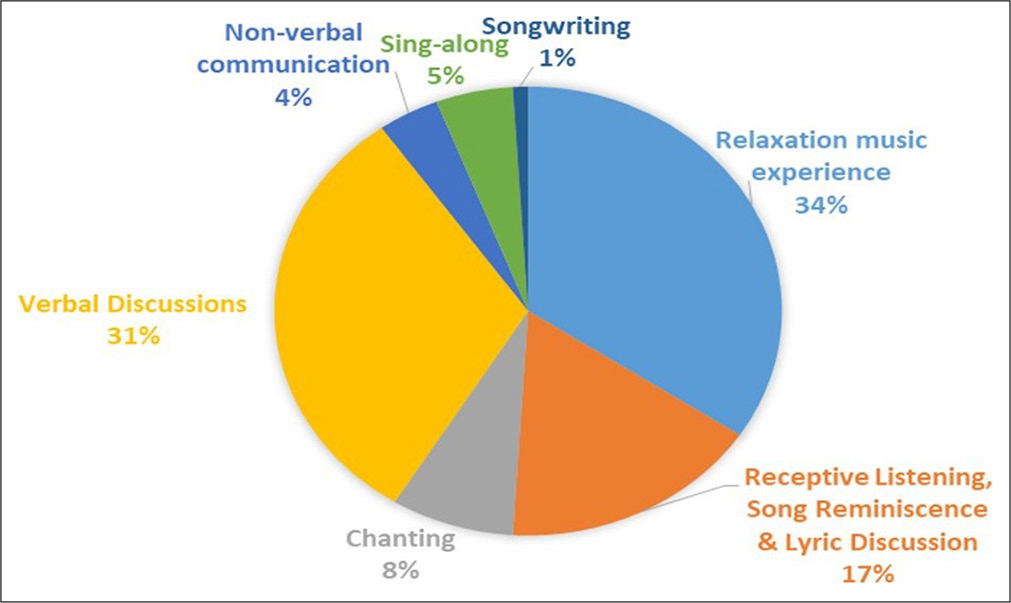
- Methods and techniques used during music therapy.
Out of a total of 102 music therapy sessions, in most of the sessions, patients showed a combination of common symptoms before the sessions [Figure 2].

- Common symptoms of enrolled pain and palliative cancer patients.
Music therapy readiness was categorised as poor, moderate or good based on various factors which indicate the patient’s physical, emotional, cognitive and social ability to participate effectively in the therapeutic process. The findings of the present research indicated that amongst the 102 music therapy sessions analysed, patients displayed a good level of readiness for music therapy in 63% of the sessions, a moderate level of readiness in 30% of the sessions, and a poor level of readiness in only 7% of the sessions [Figure 3]. Moreover, the music therapist categorised the engagement levels as low, moderate and good based on the patient’s emotional state, cognitive abilities, and physical state with the therapeutic process. The engagement levels for music therapy were observed to be good in 85% of the sessions, moderate in 10% of the sessions and low in 5% of the sessions [Figure 4].
Following the music therapy sessions, a statistically significant decrease in pain perception scores and anxiety scores was observed in comparison to the scores recorded before music therapy sessions based on the pain scale and anxiety scale, respectively. (P < 0.01) [Figures 5 and 6]. Moreover, an observable and statistically significant improvement in mood scores and intrinsic and extrinsic motivation in cancer patients were noted after the music therapy sessions (P < 0.01) [Figures 7 and 8].
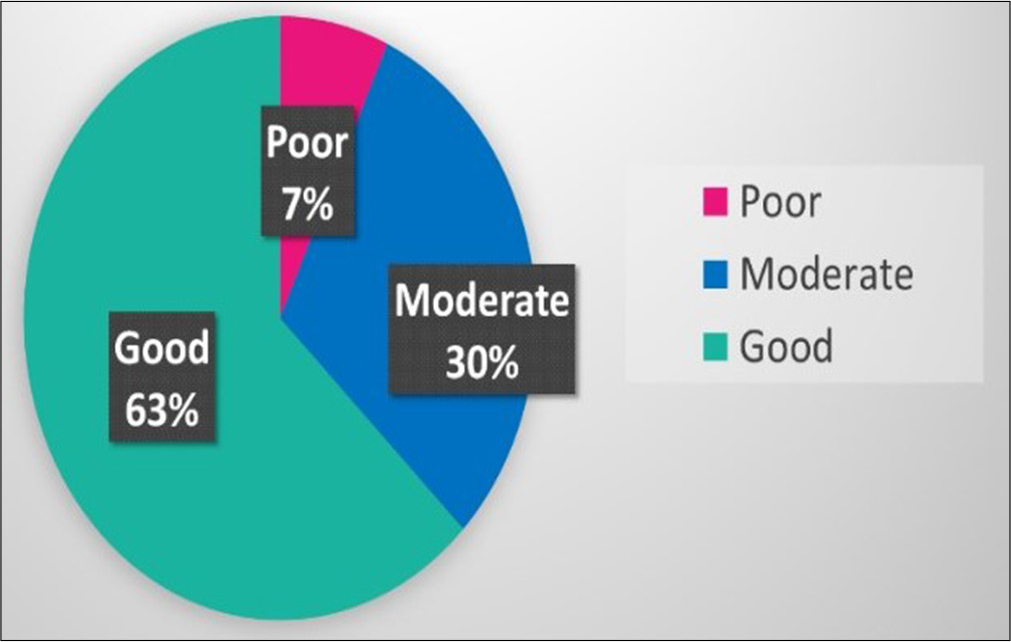
- Music therapy readiness.
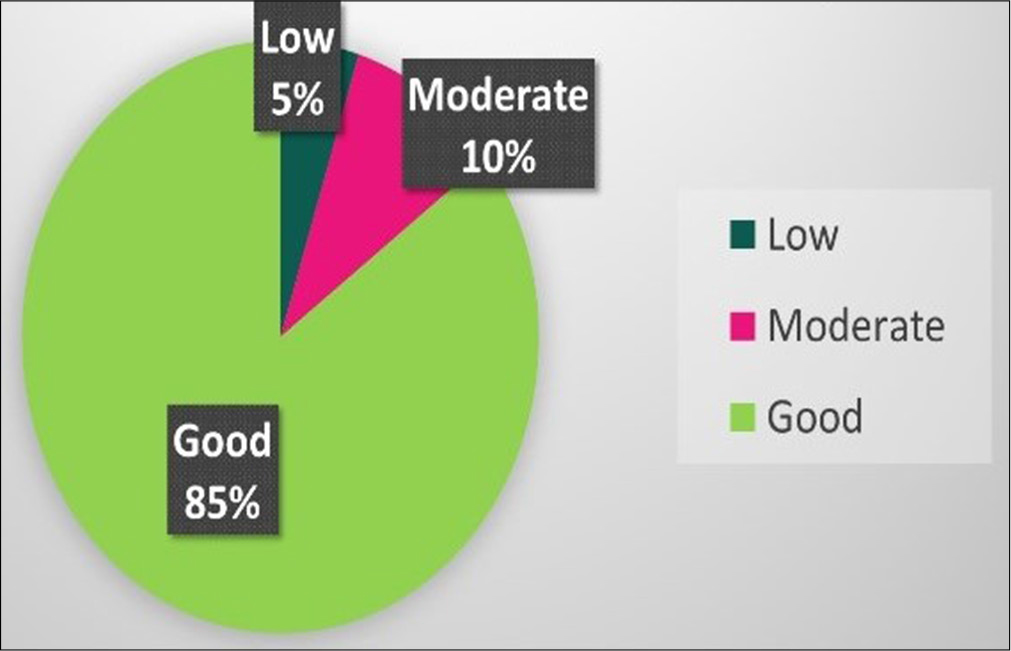
- Engagement levels during music therapy sessions.
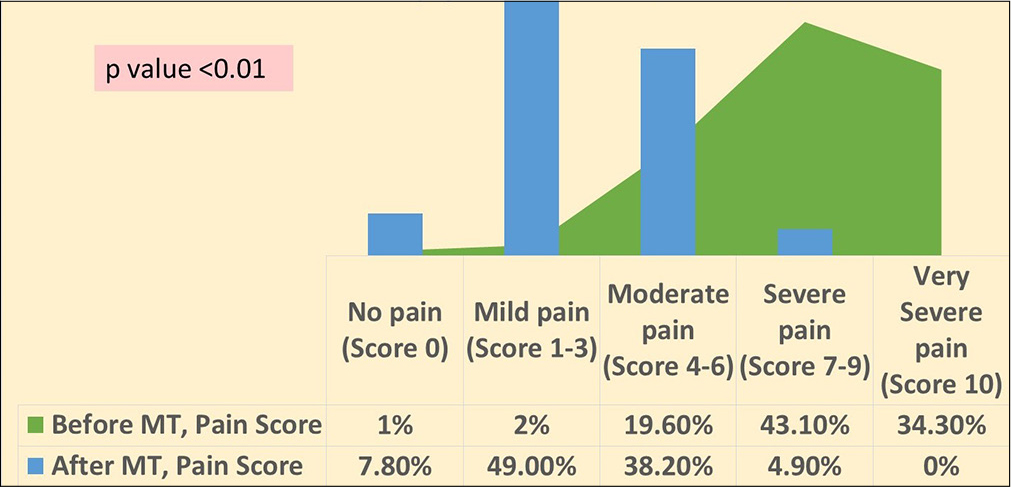
- Association of pain score with music therapy (MT) sessions.
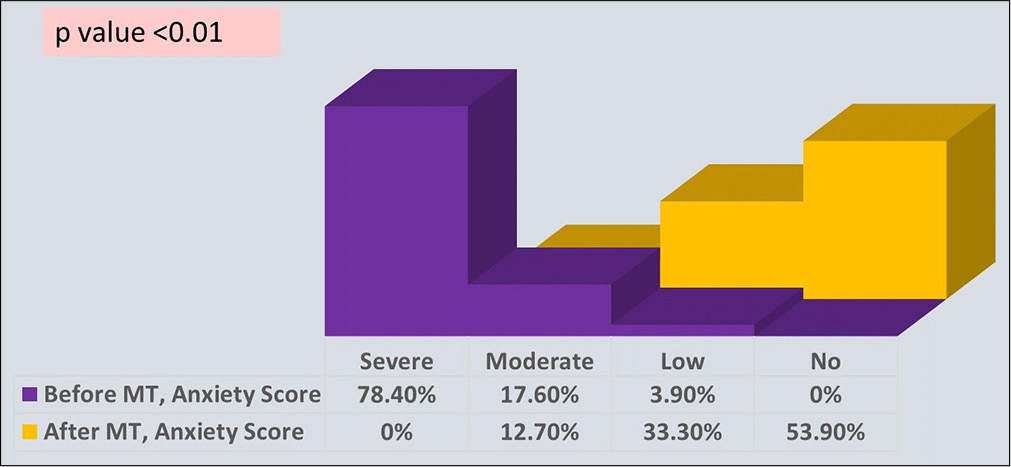
- Association of anxiety score with music therapy (MT) sessions.
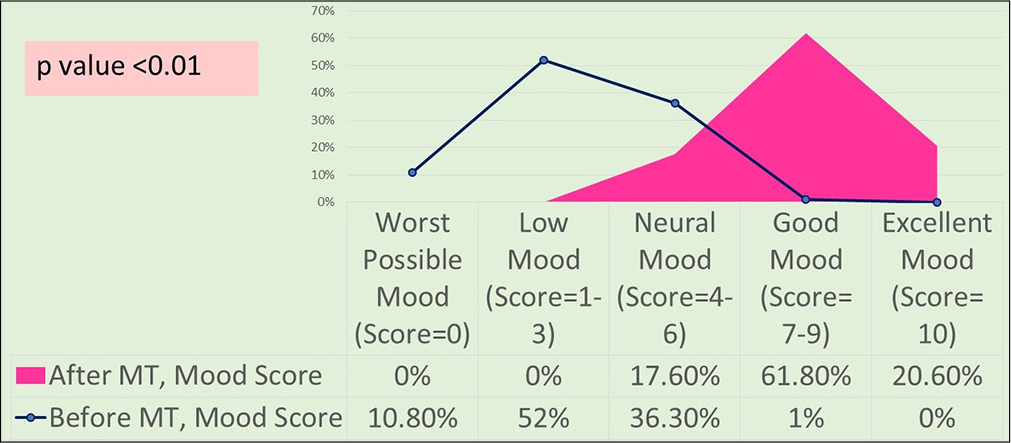
- Association of mood score with music therapy (MT) sessions.

- (a) Correlation of intrinsic motivation with music therapy (MT) sessions, (b) Correlation of extrinsic motivation with music therapy (MT) sessions.
DISCUSSION
Music therapy practices in palliative and end-of-life care, taking into account the patient’s beliefs, values and cultural practices, reduce pain perception and improve quality of life by reducing feelings of depression and anxiety.[7] Furthermore, music therapists may utilise music to enhance communication between patients and their families, as well as between patients and the medical team.[8]
In Western countries such as the United Kingdom, Germany, and the United States of America, music therapy is extensively used as a complementary treatment. Despite music’s prominent role in Indian culture, its therapeutic potential has not been widely acknowledged in India. However, based on evidence-based studies, music therapy has started being accepted and integrated gradually into the healthcare systems of the country. Numerous hospitals, care facilities and charitable organisations are now implementing music therapy to offer relief and support to a diverse range of patients.[3,9]
In the present study, music therapy was possible with an average of 2–4 music therapy sessions per patient based on the referrals from clinicians, consents of the patients, relatives and their stay in the hospital settings. In a period of 6 months, a total of 43 patients under palliative care were enrolled for the study, with a total of 102 individual music therapy sessions being administered. The average duration of each session was 30 min, suggesting that music therapy sessions lasting between 20 and 45 min could be beneficial. In a prior study, it was noted that the average session duration was 41 min, and it was suggested that music therapy sessions ranging from 30 to 45 min could be appropriate for severely ill patients, a result that is consistent with the findings of the current study.[10] Furthermore, music therapy readiness refers to an individual’s preparedness to engage in music therapy to ensure that it can have a meaningful and positive therapeutic impact. In the current study, it is found that 63% of the 102 music therapy sessions showed good readiness for music therapy. Engagement levels in music therapy refer to the degree to which an individual participates, responds and interacts during the session. The present study found that 85% of the sessions displayed a high level of engagement in music therapy. These results highlight the significance of patient participation in enhancing the effectiveness of music therapy sessions.
In the current study, the music therapist continued the majority of the sessions with relaxation training - musical experience (34%) and verbal discussions following musical experiences (31%). Another study indicated that 39% of severely ill patients favoured listening to relaxation music. Furthermore, interaction in the form of verbal discussion about the musical experiences emerged as the most commonly selected approach during music therapy sessions, emphasising the essential role of therapeutic communication between music therapists and patients navigating end-of-life situations.[10] This therapeutic relationship may provide a safe and supportive space for patients to explore and express complex emotions, facilitating meaningful conversations about end-of-life concerns. Besides, in the present study, the music therapist conducted music therapy sessions that included therapeutic verbal discussions and non-verbal communication through facial expressions and gestures with severely ill patients. This approach was aimed at normalising the hospital environment and alleviating anxiety while also establishing a secure therapeutic space for the patients. These findings underscore the significance of incorporating both verbal and non-verbal forms of communication in music therapy interventions, particularly within the realm of palliative care for cancer patients.
Medications aimed at reducing total pain may not always provide optimal relief and can lead to undesirable side effects such as sedation, nausea and constipation. These drugs primarily target the sensory dimension of pain, focusing on diminishing its intensity.[11] Within the framework of the gate control theory of pain, relaxation training through music serves as a beneficial strategy. This theory underscores the significance of non-painful stimuli, such as calming music, in closing the nerve ‘gates’ to painful input. As a result, the transmission of pain signals to the central nervous system is impeded. Moreover, this approach fosters a secure and soothing environment, which can contribute to the normalisation of the hospital environment.[12] With regard to this mechanism, in the current research, a statistically significant relationship between music therapy and pain scores before and after the music therapy sessions was observed (P < 0.01). Multiple earlier case studies have indicated a significant reduction in pain perception amongst patients in palliative care through the integration of music therapy as a complementary form of therapy.[6,13-16] In addition, a number of studies have shown a decrease in pain perception in such patients after engaging them in music therapy sessions that involve passive listening to live or recorded music. This is attributed to the heightened sense of relaxation experienced by these patients.[6,13]
The utilisation of music therapy encompassing relaxation music, verbal discussions, receptive listening to preferred songs, chanting, sing-along and effective non-verbal communication can lower the levels of stress hormones such as adrenaline and cortisol in the body. The reduction in these hormones can ease anxiety symptoms. In addition, it has the potential to stabilise pulse rate, blood pressure and respiration, thereby contributing to the reduction of anxiety and stress levels and ultimately enhancing mood. The results of our study also demonstrate the statistically noteworthy impact of music therapy on the anxiety level of the patients (P < 0.01). Numerous studies have indicated a substantial impact of music therapy on diminishing anxiety in cancer patients.[13,14,16-19]
The period from the diagnosis of cancer to its treatment has a profound impact on the physical, social and emotional well-being of the patient. This often leads to a wide range of emotions, such as anger, fear, sadness, guilt, embarrassment and shame throughout their illness. Patients experiencing frequent depressive symptoms may develop a persistent mood disturbance. Many previous studies have noted a strong correlation between music therapy and improved mood in cancer patients following the music therapy sessions.[13,17] The current study also found a statistically significant improvement in mood after the music therapy sessions (P < 0.01).
We identified a statistically significant association between music therapy and the intrinsic and extrinsic motivation of the patients admitted under palliative care (P < 0.01). These outcomes are in concordance with previous studies, and thus it revealed that music therapy, provided by a board-certified music therapist, not only assists in managing symptoms such as pain perception, anxiety reduction and mood enhancement but also offers psychosocial support and may contribute to the reinforcement of self-esteem amongst cancer patients.[20]
Limitations
A limitation of this study is the absence of a control group, as it was designed as a preliminary exploration of the impact of music therapy on cancer patients under palliative care. The current study recognises the importance of a control group and plans to include one in future studies. And will also increase the sample size to strengthen these initial findings. In addition, while experiential studies on music therapy in palliative cancer care are emerging, further studies are needed to evaluate the duration of pain and anxiety relief, changes in mood and motivation following music therapy sessions, and to investigate the requirement of breakthrough pain medication after music therapy interventions.
CONCLUSION
Music therapy can be effective for cancer patients under palliative care when customised to individuals’ preferences and health needs. It has been shown to reduce anxiety and pain management, enhance mood and boost motivation. As research progresses, the potential of music therapy to improve the quality of life for patients continues to grow.
Acknowledgement
The authors would like to thank all the participants of this study, the institutional director and management for allowing us to conduct the study, and all of the colleagues and staff who helped during the period of study. The author would like to thank the institution from which she learnt music therapy, which has played a crucial role in shaping the author’s understanding and approach to music therapy.
Ethical approval
The research/study was approved by the Institutional Review Board at The Gujarat Cancer and Research Institute, number IRC/2024/P-64, dated August 08th, 2024.
Declaration of patient consent
The authors certify that they have obtained all appropriate patient consent.
Conflicts of interest
There are no conflicts of interest.
Use of artificial intelligence (AI)-assisted technology for manuscript preparation
The authors confirm that there was no use of artificial intelligence (AI)-assisted technology for assisting in the writing or editing of the manuscript and no images were manipulated using AI.
Financial support and sponsorship: Nil.
References
- Experiencing Music Therapy Cancer Support. J Health Psychol. 2008;13:190-200.
- [CrossRef] [PubMed] [Google Scholar]
- Music Therapy in Supportive Cancer Care. Rep Pract Oncol Radiother. 2011;16:170-2.
- [CrossRef] [PubMed] [Google Scholar]
- Music Therapy Interventions in Palliative Care: A Systematic Review. J Palliat Care. 2021;36:194-205.
- [CrossRef] [PubMed] [Google Scholar]
- Complementary Music Therapy for Cancer Patients in at-Home Palliative Care and their Caregivers: Protocol for a Multicentre Randomised Controlled Trial. BMC Palliat Care. 2020;19:61.
- [CrossRef] [PubMed] [Google Scholar]
- Development and Efficacy of Music Therapy Techniques within Palliative Care. Complement Ther Clin Pract. 2016;23:125-9.
- [CrossRef] [PubMed] [Google Scholar]
- Cultural Consideration for Providing Hospice Music Therapy to Indian Patients In: Dileo C, Baroni M, eds. Music Therapy at the End of Life. 2nd ed Chapter 60. Official website of Jeffrey Books. Jeffrey Books; 2024. p. :581-91.
- [Google Scholar]
- The Role of Music Therapy in Palliative Medicine and Supportive Care. Semin Oncol. 2011;38:403-6.
- [CrossRef] [PubMed] [Google Scholar]
- Music Health and Palliative Care Through the Lens of Music Therapy IAPC. 2023. Available from: https://www.palliativecare.in/music-health-and-palliative-care-through-the-lens-of-music-therapy [Last accessed on 2024 Sep 19]
- [Google Scholar]
- Prospective Study on Music Therapy in Terminally Ill Cancer Patients during Specialized Inpatient Palliative Care. J Palliat Med. 2016;19:394-9.
- [CrossRef] [PubMed] [Google Scholar]
- Music Therapy Reduces Pain in Palliative Care Patients: A Randomized Controlled Trial. J Pain Symptom Manag. 2013;45:822-31.
- [CrossRef] [PubMed] [Google Scholar]
- Music Therapy and its Role in Pain Control. In: Music in Health and Diseases. London: IntechOpen; 2022. p. :34-9.
- [CrossRef] [Google Scholar]
- The Clinical Effects of Music Therapy in Palliative Medicine. Support Care Cancer. 2006;14:859-66.
- [CrossRef] [PubMed] [Google Scholar]
- The Effects of Music Therapy on Pain, Depression and Anxiety in Terminal Cancer Patients. Asian Oncol Nurs. 2010;10:112-8.
- [Google Scholar]
- Effect of Music Therapy on Pain and Anxiety Levels of Cancer Patients: A Pilot Study. Indian J Palliat Care. 2016;22:307-11.
- [CrossRef] [PubMed] [Google Scholar]
- The Effectiveness of Music Therapy for Patients with Cancer: A Systematic Review and Meta-Analysis. J Adv Nurs. 2020;76:1111-23.
- [CrossRef] [PubMed] [Google Scholar]
- Music-based Interventions in Palliative Cancer Care: A Review of Quantitative Studies and Neurobiological Literature. Support Care Cancer. 2013;21:2609-24.
- [CrossRef] [PubMed] [Google Scholar]
- The Effects of Music Therapy on Anxiety and Depression of Cancer Patients. Indian J Palliat Care. 2016;22:455-8.
- [CrossRef] [PubMed] [Google Scholar]
- Music Therapy: A Noninvasive Treatment to Reduce Anxiety and Pain of Colorectal Cancer Patients-a Systemic Literature Review. Medicina (Kaunas). 2023;59:482.
- [CrossRef] [PubMed] [Google Scholar]
- The Impact of Music Therapy Versus Music Medicine on Psychological Outcomes and Pain in Cancer Patients: A Mixed Methods Study. Support Care Cancer. 2015;23:1261-71.
- [CrossRef] [PubMed] [Google Scholar]







